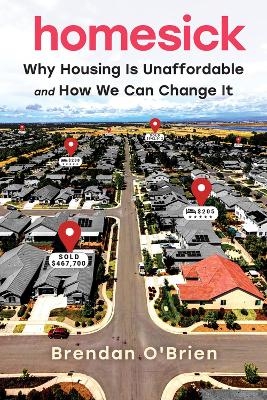
Homesick
Why Housing Is Unaffordable and How We Can Change It
Seiten
2023
Chicago Review Press (Verlag)
978-1-64160-969-2 (ISBN)
Chicago Review Press (Verlag)
978-1-64160-969-2 (ISBN)
Nobody who sits in traffic on Sedona, Arizona’s main stretch or stands shoulder-to-shoulder in its many souvenir shops would call it a ghost town.
Neither would anyone renting a room for $2,000 a month or buying a house for a half-million dollars. And yet, the people who built the small town and made it a community are being pushed further and further out. Their home is being sold out from under their feet.
In studying the impact of short-term rentals, Brendan O'Brien saw something similar happening in places ranging from Bend, Oregon, to Bar Harbor, Maine. But it isn't just short-term rentals, and it's not just tourism towns. Neighborhoods in Austin and Atlanta have become rows of investment properties. Longtime residents in Spokane and Boston have been replaced by new, high-salaried remote workers. Across the country, a level of unaffordable housing which once seemed unique to global cities like New York and San Francisco has become the norm, with nearly a third of all US households considered housing cost-burdened.
This situation has been aided by the direct actions of developers, politicians, and existing homeowners who have sought to drive up the cost of housing. But it's mostly happened due to a societal-wide refusal to see housing as anything more than real estate, another product available to the highest bidder. This trend of putting local housing on a global market has worsened in recent years but is nothing new. Housing in the United States has always been marred by racial and income inequality that mocks the country’s highest ideals.
Deeply researched and deeply felt, Homesick argues that we can be so much better. And we can start where we live.
Neither would anyone renting a room for $2,000 a month or buying a house for a half-million dollars. And yet, the people who built the small town and made it a community are being pushed further and further out. Their home is being sold out from under their feet.
In studying the impact of short-term rentals, Brendan O'Brien saw something similar happening in places ranging from Bend, Oregon, to Bar Harbor, Maine. But it isn't just short-term rentals, and it's not just tourism towns. Neighborhoods in Austin and Atlanta have become rows of investment properties. Longtime residents in Spokane and Boston have been replaced by new, high-salaried remote workers. Across the country, a level of unaffordable housing which once seemed unique to global cities like New York and San Francisco has become the norm, with nearly a third of all US households considered housing cost-burdened.
This situation has been aided by the direct actions of developers, politicians, and existing homeowners who have sought to drive up the cost of housing. But it's mostly happened due to a societal-wide refusal to see housing as anything more than real estate, another product available to the highest bidder. This trend of putting local housing on a global market has worsened in recent years but is nothing new. Housing in the United States has always been marred by racial and income inequality that mocks the country’s highest ideals.
Deeply researched and deeply felt, Homesick argues that we can be so much better. And we can start where we live.
Brendan O'Brien spent three seasons working for federal public land management agencies in California, Montana, and New Mexico. He observed the influx of short-term rentals and non-primary homes alongside rising rents and prices. Studying this link became the basis of his master's thesis from Northern Arizona University as well as the article "When Boom Towns Become Ghost Towns in the New West." He lives in Flagstaff, Arizona.
| Erscheinungsdatum | 05.09.2023 |
|---|---|
| Zusatzinfo | Illustrations |
| Verlagsort | Chicago |
| Sprache | englisch |
| Maße | 152 x 228 mm |
| Gewicht | 535 g |
| Themenwelt | Geisteswissenschaften ► Geschichte ► Regional- / Ländergeschichte |
| Sozialwissenschaften ► Soziologie ► Makrosoziologie | |
| Wirtschaft ► Betriebswirtschaft / Management ► Rechnungswesen / Bilanzen | |
| Betriebswirtschaft / Management ► Spezielle Betriebswirtschaftslehre ► Immobilienwirtschaft | |
| ISBN-10 | 1-64160-969-9 / 1641609699 |
| ISBN-13 | 978-1-64160-969-2 / 9781641609692 |
| Zustand | Neuware |
| Haben Sie eine Frage zum Produkt? |
Mehr entdecken
aus dem Bereich
aus dem Bereich
Erfolgsstrategien für den modernen Immobilienmarkt
Buch | Softcover (2024)
ForwardVerlag
18,00 €
Handbuch für Studium und Praxis
Buch | Hardcover (2023)
Vahlen (Verlag)
79,00 €
warum Rene Benkos Immobilienimperium zusammenbrach und was dem …
Buch | Hardcover (2024)
FinanzBuch Verlag
22,00 €


